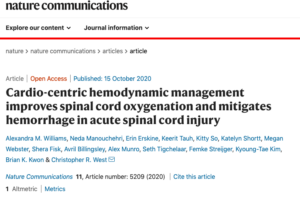 ICORD principal investigators Dr. Christopher West and Dr. Brian Kwon and their research teams have published a study that challenges the current standard for managing blood pressure in people with spinal cord injury (SCI).
ICORD principal investigators Dr. Christopher West and Dr. Brian Kwon and their research teams have published a study that challenges the current standard for managing blood pressure in people with spinal cord injury (SCI).
The findings could lead to a change in the way newly injured patients have their blood pressure managed, potentially improving their chances of retaining more function in the long term.
This study, published today in Nature Communications, demonstrated that following high-thoracic SCI, the heart’s ability to contract is impaired, leading to reduced spinal cord blood flow. Currently, a patient being treated for acute SCI has their blood pressure managed using drugs that cause their blood vessels to constrict in order to increase blood pressure. In this study, Drs. West and Kwon and their team used an experimental treatment targeting the heart to beat more powerfully, which increased the amount of blood ejected and also increased blood pressure.
“The key difference is that by targeting the heart, we increase blood pressure by increasing blood flow instead of by causing the blood vessels to narrow,” said Dr. West. “This is important because by increasing blood flow we can deliver more blood and oxygen to the spinal cord which is expected to minimize the damage at the epicentre of the injury, and therefore reduce injury severity and bleeding in the cord, both of which are expected to improve the chances of people with SCI retaining more function.”
This could mean in the future that an individual who is newly admitted to the hospital may receive a different drug during their initial period of post-injury management. If proven to be effective in humans with SCI, it could improve their chances of retaining more function in the long-term.
“It is important to note that one of the only things we can currently do for acute SCI patients is to try to optimize the supply of blood and oxygen to the injured spinal cord to prevent further secondary injury,” said Dr. Kwon. “We need to seek ways of delivering this care in the most effective manner possible, as any bit of spinal cord function that could be improved upon by novel approaches such as this would potentially be very impactful to a patient.”

ICORD postdoctoral fellow Dr. Alex Williams is first author of the manuscript.
“Cardio-centric hemodynamic management improves spinal cord oxygenation and mitigates hemorrhage in acute spinal cord injury” was published in the October 15, 2020, issue of Nature Communications. Authors: Alexandra M. Williams, Neda Manouchehri, Erin Erskine, Keerit Tauh, Kitty So, Katelyn Shortt, Megan Webster, Shera Fisk, Avril Billingsley, Alex Munro, Seth Tigchelaar, Femke Streijger, Kyoung-Tae Kim, Brian K. Kwon, Christopher R. West. DOI 10.1038/s41467-020-18905-8

